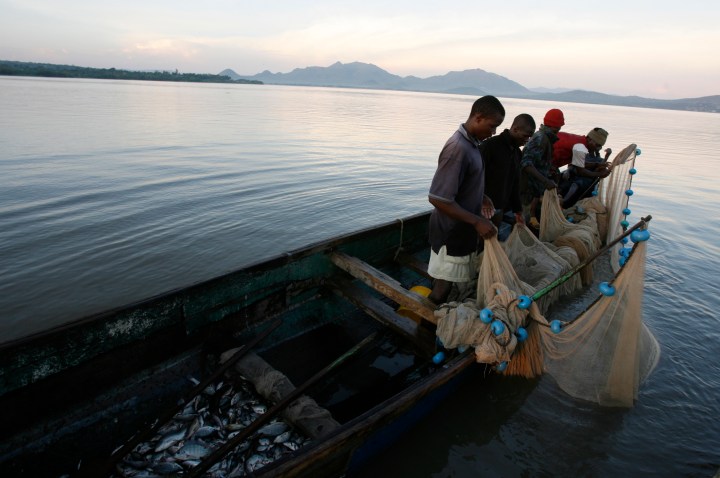ISS TODAY OP-ED
Rising demand from China pushes up illegal depletion of Lake Victoria’s Nile perch swim bladders

Nile perch swim bladders, used in Chinese cuisine and traditional medicine, are illegally extracted from breeding and juvenile fish.
Sarah Ddungu, a former public health official turned fisherwoman, says the trade in Nile perch swim bladders has given her family a good life in her retirement. Ddungu operates four boats on Lake Victoria in Uganda, and sells the bladders to local middlemen, who in turn sell them to Chinese buyers. A swim bladder is a gas-filled organ underneath the fish that regulates its buoyancy in water.
Increased demand for the bladders has led to their illegal extraction from breeding and juvenile stocks, depleting Lake Victoria’s Nile perch population and robbing East Africa of millions of dollars in revenue every year.
Swim bladders, also known as fish maw, are considered a delicacy in Chinese cuisine and are used in Chinese traditional medicine as an aphrodisiac and to boost immunity and aid recovery. The fish organs are also used to manufacture surgical threads.
China previously sourced swim bladders from the totoaba fish off the coast of Mexico, but that species is now endangered and its trade is highly regulated. As a result, market attention has shifted to Lake Victoria’s Nile perch, which is increasingly sought after.
Over 290 tonnes of swim bladders were exported from Kenya to Asia in 2018. Uganda, which produces at least 520 tonnes of Nile perch swim bladder annually, exported 51% of its catch to Hong Kong between 2012 and 2019. In 2018 alone, Uganda sold Nile perch swim bladders worth $52.1-million.
Patrick Otuo, an Associate Scientist at the Kenya Marine and Fisheries Research Institute, told the Enact project that swim bladders are the most profitable part of the fish. At local markets, 1 kg of whole Nile perch sells at $5, while 1 kg of swim bladder is sold to local middlemen at $200. In China, the same quantity fetches up to $1,000. It’s even more expensive in Hong Kong, where the selling price can reach $7,700.
Kenya, Uganda and Tanzania collectively exported 1,747 tonnes of Nile perch swim bladders worth $124-million to Hong Kong in 2018. But the fish maw trade is estimated to contribute only $86-million annually to East Africa’s economy. The discrepancy is what the region is losing as a result of local fishermen selling swim bladders to foreign intermediaries who trade them for vast profits in China and Hong Kong.
A 2020 Traffic study on the fish maw trade found that locals and foreigners from China and India were involved in selling Nile perch swim bladders in and from East Africa. Once sold to middlemen, the swim bladders are supplied to processing factories owned by Chinese traders.
Illegal fishing
Fishermen in search of the organs have been accused of harvesting juvenile fish that weigh 1 kg or less, which is illegal. Catching immature fish threatens the sustainability of Lake Victoria’s fish species.
Rising demand has also led to the use of illegal fishing methods. Monofilament nets, which Tanzania has banned, have been used to catch Nile perch due to their ready availability on the Kenyan market. These nets are made of plastic and don’t decompose. Such illicit activities are enabled by the lack of uniform fishing regulations, especially regarding gear and nets in Lake Victoria.
Otuo told Enact that the high demand for swim bladders had contributed to the overfishing of Nile perch in Lake Victoria. This affects the food security of residents, who are forced to rely on immature fish or the small dagaa fish species for consumption.
The Uganda Fishmaws Traders Association reports that the demand for Nile perch swim bladders has led to unregulated and illicit gutting and extraction of the organ. After the bladders are removed, thousands of kilograms of harvested Nile perch are illegally dumped into Lake Victoria. Excessive fish waste causes oxygen depletion in the water, which encourages algae to bloom, and endangers living fish.
Various fishing laws in Kenya, Uganda and Tanzania target criminal activities in East Africa’s fishing industry. But these national regulations lack uniformity and coherence, which hampers the enforcement of the East African Community Guidelines on Extraction, Processing, and Trading of Nile Perch Maws.
Enforcing these guidelines is vital for controlling the illegal extraction of Nile perch swim bladders, and the sustainability of the species and fish maw trade locally and globally. This includes reducing the fishing of immature Nile perch by ensuring that swim bladders are only extracted from Nile perch at least 52 cm long.
Implementing the East African Community guidelines would reduce the exploitation by Chinese and Indian traders, and generate more revenue for governments. Incorporating the guidelines into national fisheries and fish trade legislation would also help fisheries and customs officials inspect and certify swim bladders for export. DM
Willis Okumu, ENACT Senior Researcher, Eastern Africa, Institute for Security Studies (ISS) Nairobi.
Enact is funded by the European Union and implemented by the Institute for Security Studies in partnership with Interpol and the Global Initiative against Transnational Organized Crime.
First published by ISS Today.

















 Become an Insider
Become an Insider
Comments - Please login in order to comment.